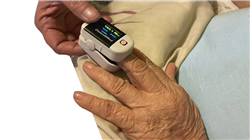University certificate
The world's largest faculty of nursing”
Introduction to the Program
This 100% online Postgraduate certificate will provide you with specialized knowledge and crucial competencies to improve the quality of patient care and their family environment. With all the TECH quality guarantees!"

Advances in understanding the emotional impact of the terminal illness process have promoted a more holistic, family-centered approach. As a result, Nursing professionals are increasingly able to provide adequate emotional support, offering spaces for active listening, counseling and resources to help families cope with loss and grief.
At this juncture, TECH has implemented this Postgraduate certificate, which will address the intersection between psychology and medical care, especially in contexts of advanced illness. Through this specialization, professionals will be able to apply psychological principles to improve the understanding and management of emotions, stress and bereavement.
The syllabus will also enhance graduates' communication skills to ensure effective and compassionate interaction, which is key to managing sensitive situations such as discussing prognoses and treatment options. In addition, they will be instructed on how to design procedures that avoid the conspiracy of silence, a common phenomenon where family members and professionals avoid talking about the seriousness of the situation to protect the patient, but which often results in increased anxiety and isolation.
Finally, fundamental clinical and ethical issues, such as the differences between palliative sedation and euthanasia, will be discussed in depth. In this regard, concepts, practices and legal considerations will be clarified, allowing nurses to better understand their roles and ethical decisions in end-of-life care. In addition, advanced strategies will be developed to help families manage bereavement.
In this way, TECH has launched a complete and fully online program, created specifically to meet the specific needs of students, who will only need an electronic device connected to the Internet to access the study materials. In addition, it integrates the innovative Relearning methodology, which consists of the repetition of key concepts to facilitate and improve the assimilation of the content.
You will sensitively and effectively manage the emotional and psychosocial aspects of grief, facilitating better communication and support during the most difficult times of terminal illness. Enroll now!"
This Postgraduate certificate in Family and Bereavement Support in Palliative Care for Nursing contains the most complete and up-to-date scientific program on the market. The most important features include:
- The development of case studies presented by experts in Family and Bereavement Support in Palliative Care for Nursing
- The graphic, schematic and eminently practical contents with which it is conceived gather scientific and practical information on those disciplines that are indispensable for professional practice
- Practical exercises where the self-assessment process can be carried out to improve learning
- Its special emphasis on innovative methodologies
- Theoretical lessons, questions to the expert, debate forums on controversial topics, and individual reflection assignments
- Content that is accessible from any fixed or portable device with an Internet connection
You'll break down communication barriers in an ethical and empathetic manner, ensuring that the patient's loved ones are adequately informed and supported, thanks to a comprehensive library of multimedia resources"
The program’s teaching staff includes professionals from the sector who contribute their work experience to this specializing program, as well as renowned specialists from leading societies and prestigious universities.
The multimedia content, developed with the latest educational technology, will provide the professional with situated and contextual learning, i.e., a simulated environment that will provide immersive education programmed to learn in real situations.
This program is designed around Problem-Based Learning, whereby the professional must try to solve the different professional practice situations that arise during the course. For this purpose, students will be assisted by an innovative interactive video system created by renowned and experienced experts.
You will focus on crucial ethical and clinical issues, such as differentiating between palliative sedation and euthanasia, as well as developing strategies to avoid the conspiracy of silence"

You will dive into understanding the emotional and psychosocial dimensions of terminal illness, equipping you with tools to address these areas effectively"
Why study at TECH?
TECH is the world’s largest online university. With an impressive catalog of more than 14,000 university programs available in 11 languages, it is positioned as a leader in employability, with a 99% job placement rate. In addition, it relies on an enormous faculty of more than 6,000 professors of the highest international renown.

Study at the world's largest online university and guarantee your professional success. The future starts at TECH”
The world’s best online university according to FORBES
The prestigious Forbes magazine, specialized in business and finance, has highlighted TECH as “the world's best online university” This is what they have recently stated in an article in their digital edition in which they echo the success story of this institution, “thanks to the academic offer it provides, the selection of its teaching staff, and an innovative learning method aimed at educating the professionals of the future”
A revolutionary study method, a cutting-edge faculty and a practical focus: the key to TECH's success.
The most complete study plans on the university scene
TECH offers the most complete study plans on the university scene, with syllabuses that cover fundamental concepts and, at the same time, the main scientific advances in their specific scientific areas. In addition, these programs are continuously being updated to guarantee students the academic vanguard and the most in-demand professional skills. In this way, the university's qualifications provide its graduates with a significant advantage to propel their careers to success.
TECH offers the most comprehensive and intensive study plans on the current university scene.
A world-class teaching staff
TECH's teaching staff is made up of more than 6,000 professors with the highest international recognition. Professors, researchers and top executives of multinational companies, including Isaiah Covington, performance coach of the Boston Celtics; Magda Romanska, principal investigator at Harvard MetaLAB; Ignacio Wistumba, chairman of the department of translational molecular pathology at MD Anderson Cancer Center; and D.W. Pine, creative director of TIME magazine, among others.
Internationally renowned experts, specialized in different branches of Health, Technology, Communication and Business, form part of the TECH faculty.
A unique learning method
TECH is the first university to use Relearning in all its programs. It is the best online learning methodology, accredited with international teaching quality certifications, provided by prestigious educational agencies. In addition, this disruptive educational model is complemented with the “Case Method”, thereby setting up a unique online teaching strategy. Innovative teaching resources are also implemented, including detailed videos, infographics and interactive summaries.
TECH combines Relearning and the Case Method in all its university programs to guarantee excellent theoretical and practical learning, studying whenever and wherever you want.
The world's largest online university
TECH is the world’s largest online university. We are the largest educational institution, with the best and widest online educational catalog, one hundred percent online and covering the vast majority of areas of knowledge. We offer a large selection of our own degrees and accredited online undergraduate and postgraduate degrees. In total, more than 14,000 university degrees, in eleven different languages, make us the largest educational largest in the world.
TECH has the world's most extensive catalog of academic and official programs, available in more than 11 languages.
Google Premier Partner
The American technology giant has awarded TECH the Google Google Premier Partner badge. This award, which is only available to 3% of the world's companies, highlights the efficient, flexible and tailored experience that this university provides to students. The recognition as a Google Premier Partner not only accredits the maximum rigor, performance and investment in TECH's digital infrastructures, but also places this university as one of the world's leading technology companies.
Google has positioned TECH in the top 3% of the world's most important technology companies by awarding it its Google Premier Partner badge.
The official online university of the NBA
TECH is the official online university of the NBA. Thanks to our agreement with the biggest league in basketball, we offer our students exclusive university programs, as well as a wide variety of educational resources focused on the business of the league and other areas of the sports industry. Each program is made up of a uniquely designed syllabus and features exceptional guest hosts: professionals with a distinguished sports background who will offer their expertise on the most relevant topics.
TECH has been selected by the NBA, the world's top basketball league, as its official online university.
The top-rated university by its students
Students have positioned TECH as the world's top-rated university on the main review websites, with a highest rating of 4.9 out of 5, obtained from more than 1,000 reviews. These results consolidate TECH as the benchmark university institution at an international level, reflecting the excellence and positive impact of its educational model.” reflecting the excellence and positive impact of its educational model.”
TECH is the world’s top-rated university by its students.
Leaders in employability
TECH has managed to become the leading university in employability. 99% of its students obtain jobs in the academic field they have studied, within one year of completing any of the university's programs. A similar number achieve immediate career enhancement. All this thanks to a study methodology that bases its effectiveness on the acquisition of practical skills, which are absolutely necessary for professional development.
99% of TECH graduates find a job within a year of completing their studies.
Postgraduate Certificate in Family and Bereavement Support in Palliative Care for Nursing
Would you like to offer compassionate and effective accompaniment to families of patients in palliative care? TECH Global University has the ideal program for you. Through a comprehensive Postgraduate Certificate you will master emotional support, effective communication and grief management in end-of-life situations. During this program, taught 100% online, you will learn to provide support and guidance to families of palliative care patients, understanding their emotional, social and spiritual needs throughout the illness and bereavement process. You will acquire knowledge about empathic communication strategies, conflict resolution and teamwork with other health and social service professionals. One of the outstanding advantages of our program is the integration of multidisciplinary approaches to develop skills to effectively support and accompany families through difficult times.
Get qualified with a Postgraduate Certificate in Family and Bereavement Care in Palliative Care for Nursing
The online modality of our course gives you the flexibility to study from anywhere and at any time, adapting your learning schedule to your work and personal responsibilities. You will have access to virtual classes taught by experts in family and bereavement care in palliative care, as well as interactive teaching resources and innovative learning tools. In addition, you will be supported by a team of specialized tutors and mentors who will guide you throughout the course, providing personalized feedback and academic guidance to maximize your learning and professional development in the field of family and bereavement care in palliative care. Upon completion, you will earn a recognized qualification that supports your skills and experience in this crucial field of health care. This certification will open up new career opportunities and allow you to make a significant contribution to the well-being and quality of life of families of patients in end-of-life situations.







